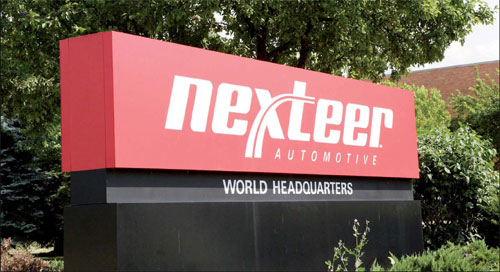Chinese deal has steered Michigan's Nexteer to safety
Updated: 2012-04-20 07:55
By David Lariviere (China Daily)
|
||||||||
|
|
16 months after acquisition, apprehension turns into confidence
Nexteer Automotive CEO Bob Remenar admits to having some trepidation in the months prior to the company's buyout by China's Pacific Century Motors in November 2010.
"Of course," Remenar says. "Some people thought our intellectual property would be all boxed up and shipped to China, but we haven't sent one patent or one job over there."
Pacific Century Motors, an entity formed by Tempo International Group and Beijing E-Town International Investment & Development Co, an investment arm controlled by the Beijing municipal government, agreed to buy the full stake in Nexteer Automotive from General Motors Co.
The deal was valued at $465 million. Nexteer, headquartered in Saginaw, Michigan, is the world's third-largest company in terms of sales of driveshaft components and a major manufacturer of steering systems. Its revenue was more than $2 billion last year.
The deal was one of the largest individual investments by a Chinese firm in the auto components industry. In just 16 months since the deal, Nexteer has added 600 employees to increase the Saginaw workforce to 4,200 out of 10,000 worldwide. Sixty percent of the employees work outside the United States in places such as Eastern Europe, India, Australia, South America, Mexico and China.
Remenar says there was also the perception that Pacific Century Motors would be "parachuting in and maybe wiping our executive team out, but I'm still here". Remenar is one of four on the board of directors along with chairman Zhao Guibin and two others from China.
Saginaw Mayor Greg Branch, who wasn't involved in the negotiating process, says: "My personal feeling (about the Chinese) was that they were better for us than any capital partners because the Chinese were in it more for the long haul. It was the right balance."
"Platinum (Equity) probably would have streamlined it a lot in order to make a profit," Branch says, speaking of the Los Angeles private equity firm that was in serious talks to buy Nexteer before the recession hit in 2008.
|
|
But trust was a major issue for Remenar and he wasn't convinced about a possible deal with Platinum.
"The Chinese came to me and said, 'What do we have to do?'" Remenar recalls. "I will give the Chinese investors credit - they didn't pause for one second and the UAW (United Auto Workers) took that as a positive sign. I don't know if (the UAW) was surprised but it was a pleasant offering. All the investors got the same advice, but the Chinese investors acted on the advice."
Remenar says he was looking for a buyer that was willing to invest in the product on a global basis.
"Future success will require us to embrace new cultures, new ideas and new opportunities, since, in the end, everyone will benefit when the investment produces," he explains.
"PCM also made use of global advisers to assist in the acquisition process of Nexteer," Remenar says. "They provided valuable insight into the diligence and acquisition process that allowed the transaction to be completed on a timely basis."
The strategy is paying off for Remenar and the company. Nexteer's global revenue last year reached about $2.2 billion, a 10 percent increase over 2010. Since it is a privately held company, it did not disclose exact figures.
Innovation is a top priority today. The company hired 100 engineers last year and is looking to add 80 more in 2012. A $150-million investment in October will result in the retention of 1,000 jobs at the Saginaw site. The investment also secures business through 2018. PCM pledged $15 billion in capital to Nexteer globally.
"There was a lot of concern for a few years that they would pick up the patents and leave, but the real value in Nexteer is the patents they haven't come up with yet," Branch says.
Remenar would advise any business looking to cooperate with a Chinese investor "to recognize that the Chinese are not mysterious. They have the same expectations of any investor. All investors want business perfection and value creation regardless of their country of origin. We face challenges in understanding and communications, but not in the desire for success".
Branch explains that the deal was beneficial to Nexteer in two distinct ways.
"First, it was really exciting preserving jobs in Saginaw County and number two, it gives the company access to the fastest growing market in the world," he says.
The two other options GM had would not have presented Nexteer with as bright a future: selling to a competitor, thus ensuring supply consolidation; or selling to a non-steering investor, which would not be as likely to make a long-term commitment.
The biggest change since the takeover, Remenar says, happened when PCM told Nexteer to simply concentrate on growing globally, which will take time.
"It's not like in 15 minutes, you get a hamburger," Remenar says. "The gestation of our product takes three to four years for design and testing."
Neither GM nor Delphi, the previous owners, had the financial means to be patient. Steering was one of five divisions of Delphi when it filed for bankruptcy in 2005. "We were profitable but troubled," Remenar says.
Most of the troubles are behind Nexteer today.
"We are glad to be in alignment with our owners and we intend to become a global leader in technology, revenue and financial results. Part of our vision is also to be a model global industrial company - one that honors all commitments with our customers, suppliers and employees," he says.
"I think we look at things from a really different prism on the local level," Branch says. "You're looking at the nuts and bolts of the economy."
dlariviere@chinadailyusa.com

 Relief reaches isolated village
Relief reaches isolated village
 Rainfall poses new threats to quake-hit region
Rainfall poses new threats to quake-hit region
 Funerals begin for Boston bombing victims
Funerals begin for Boston bombing victims
 Quake takeaway from China's Air Force
Quake takeaway from China's Air Force
 Obama celebrates young inventors at science fair
Obama celebrates young inventors at science fair
 Earth Day marked around the world
Earth Day marked around the world
 Volunteer team helping students find sense of normalcy
Volunteer team helping students find sense of normalcy
 Ethnic groups quick to join rescue efforts
Ethnic groups quick to join rescue efforts
Most Viewed
Editor's Picks

|

|

|

|

|

|
Today's Top News
Health new priority for quake zone
Xi meets US top military officer
Japan's boats driven out of Diaoyu
China mulls online shopping legislation
Bird flu death toll rises to 22
Putin appoints new ambassador to China
Japanese ships blocked from Diaoyu Islands
Inspired by Guan, more Chinese pick up golf
US Weekly

|

|








